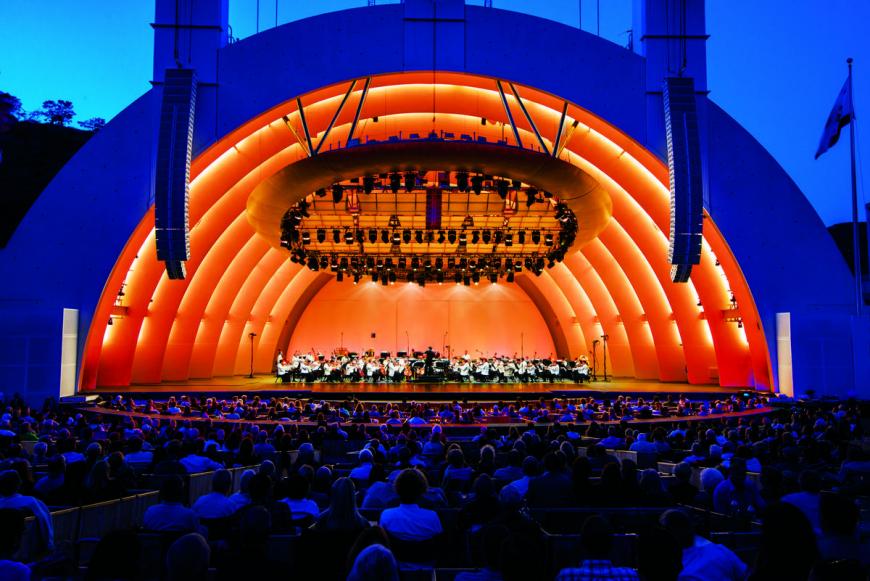
As Los Angeles begins to open performing-arts venues after a near 16-month shutdown because of the global pandemic, audiences are gratefully — and gleefully — returning to hear live music once again. And while indoor mask mandates have been reinstated in L.A. County, the beloved Hollywood Bowl, which celebrates its 100-year anniversary in 2022 and is the summer home of the Los Angeles Philharmonic, is now operating at full capacity, its classical season already in high gear.
LA Phil Music and Artistic Director Gustavo Dudamel is on track to conduct a series of concerts — five weeks’ worth, to be exact — with six former Dudamel Fellows also taking to the podium through September. (The Dudamel Fellowship Program was created by the conductor in conjunction with the Phil in 2009 in order to provide opportunities for promising young conductors from around the world. As Fellows, these musicians develop their craft through personal mentorship and participation in the orchestra’s education and community programs, as well as working alongside Dudamel.)
What’s especially striking about this season’s roster is that four of these Fellows are not only making their Bowl debuts, but are also women: Tianyi Lu raised her baton on July 20; Ruth Reinhardt led the orchestra July 27; Gemma New will conduct on August 5; and Marta Gardolińska bows on September 9. (In addition, Enluis Montes Olivar led the band on July 22, while Paolo Bortolameolli, associate conductor of the Phil, returns to the podium on August 31.)
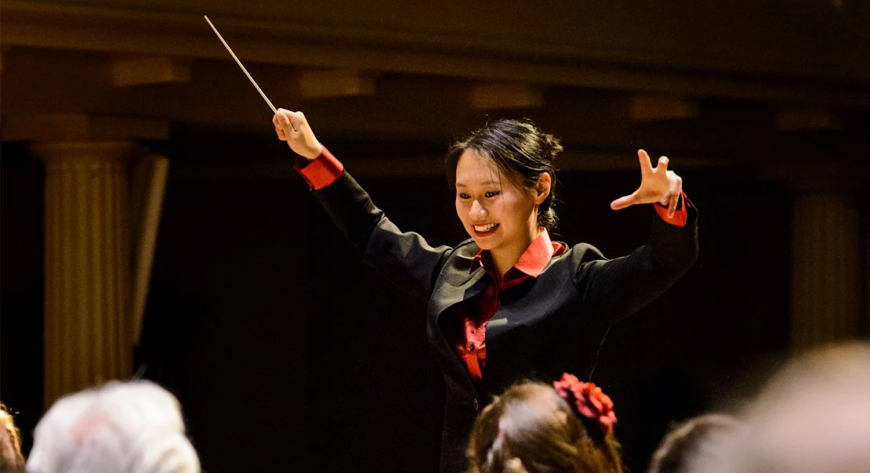
It goes without saying that making any debut with a world-class orchestra is exhilarating, if a bit nerve wracking, but being on the iconic Bowl stage, which has played host over the years to countless musical greats, including Jascha Heifetz, Igor Stravinsky, jazz artist Ella Fitzgerald, and yes, even The Beatles, who made appearances in 1964 and 1965, is decidedly a thrill. For New Zealand-born, San Diego-based Gemma New, who was named a Dudamel Fellow in 2014 and was to have graced the Bowl stage for the first time last year before the concert was cancelled because of COVID-19, it was a major stepping stone in her then burgeoning career.
“I was elated and excited to be named a Fellow,” New, 34, recalled, “because it’s such an amazing opportunity for a young conductor. The year before, in 2013, I got the call that Esa-Pekka Salonen needed an assistant conductor in Bartók’s Music for Strings, Percussion, and Celesta, and I said, ‘Yes.’ I was [associate conductor] of the New Jersey Symphony at the time and they allowed me to take that week off. It was heavenly to hear the [L.A.] orchestra and play in Walt Disney Concert Hall.
“So to become a Dudamel Fellow the next year, I was enthralled, and throughout the three years, I assisted Dudamel for 18 programs, three months in total. They have so many great conductors and soloists come through, and all of the musicians in the orchestra are so sublime, it made me expand my horizons on what I thought an orchestra could do. I loved to listen to them play and also would be taking notes in my scores when Dudamel was conducting, because he has such great ideas.”
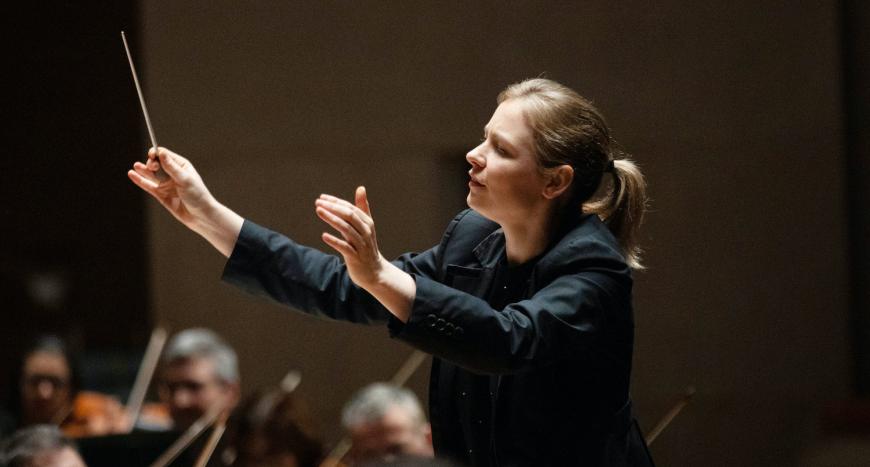
New, the recipient of the 2021 Solti Conducting Award, is currently music director of the Hamilton Philharmonic Orchestra in Ontario, Canada, as well as principal guest conductor of the Dallas Symphony Orchestra. She programmed her Bowl concert with Sarah Gibson’s 12-minute, warp & weft, Beethoven’s Piano Concerto No. 1, with soloist Behzod Abduraimov, and Robert Schumann’s Symphony No. 3, “Rhenish.”
New said that she met Gibson, who, with Thomas Kotcheff, co-founded the piano duo Hocket, at Tanglewood in 2018. “There’s something for everyone in this piece that was inspired by [1970s feminist] artist Miriam Schapiro. Sarah’s a skillful writer and structurally it takes you on a creative journey. Warp and weft is a loom you use to weave and when you hear the work, you hear many styles.”
A commission from the Los Angeles Chamber Orchestra, Gibson’s work premiered in 2019, with New an avid proponent of contemporary music. The conductor explained: “I always like to have music of our time on a program. I want audiences to relate to a composer living with us and have things that are relevant to our generation,” adding, “I have done this piece in Seattle recently and will take it to Atlanta at the end of the year.”
While rehearsal time at the Bowl is undeniably short — three hours — New, who began playing violin as a child and said she fell in love with playing in an orchestra at age 12, recalled that her first chance to conduct was in high school three years later. “I decided to be a conductor because I wanted to find a way to express music and I loved bringing everyone together with all the parts and what the music was telling me.”
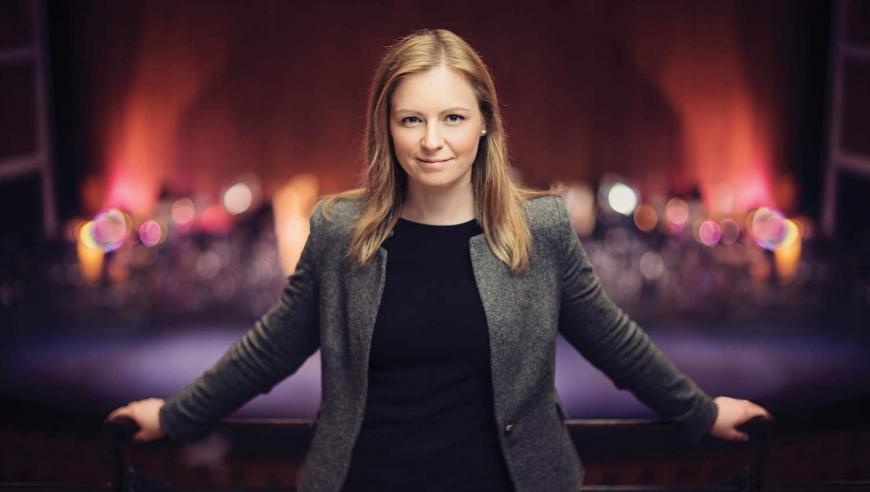
It’s no surprise, then, that New feels that way still, no matter how abbreviated the rehearsal time. “I like to think of an orchestra as something so powerful and beautiful and captivating and it’s something we all need to do together, in harmony, to make it work. It’s the greatest example of a society that works well so that we can do great things.
“As a conductor,” New continued, “I see my role as being able to make decisions in order to unite and find the strongest interpretation and unify everyone’s experience and their talents, their strengths. That way we can find the best interpretation for that work. A conductor’s job is in the preparation before the first rehearsal.”
To that end, she explained that 90 percent of her time is spent reediting or “clarifying a set of parts, so that we’re on the same page from the very beginning. Whether it’s Schumann, Beethoven, or Mozart, we have a united front already and if we have a three-hour rehearsal, we can harness [the music] in a short period of time. I know how much the orchestra is used to this and I totally trust them. As a conductor, you want to make musicians feel inspired, free, and comfortable. It’s finding that balance and having everything in order.”
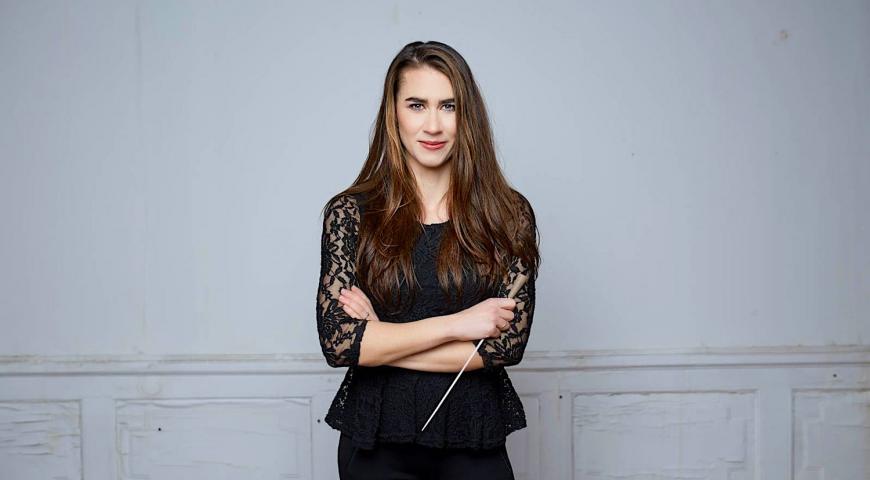
At 32, Polish conductor Marta Gardolińska, who spent several years professionally training in acrobatics, swimming, and middle-distance running, as well as studying flute and piano, admitted that the decision for her to become a professional musician came late. “When I was finishing high school and my first exams in Warsaw, the plan was to study physiotherapy and do a bachelor’s degree in conducting to learn about music so I could treat musicians,” she said.
Happily, her hands found another way of expressing themselves: A rising star in the classical firmament, Gardolińska, who participated in a student exchange program in Vienna and currently makes her home there, confessed that music pulled her in when she began meeting inspiring teachers and musicians. “After many years of studying,” she added, “my lucky strike was when everything clicked in 2018. Until then, it was relatively going OK, but it was never bringing anything to the table and I was seriously considering quitting.”
But then Gardolińska went to an audition in England, winning the position of Young Conductor in Association at the Bournemouth Symphony Orchestra. “It was a perfect place for me and there were fantastic opportunities. From there, everything started. I was lucky to jump in twice on the subscription series and the second time I jumped in, that’s when I got noticed by the Los Angeles Philharmonic.”
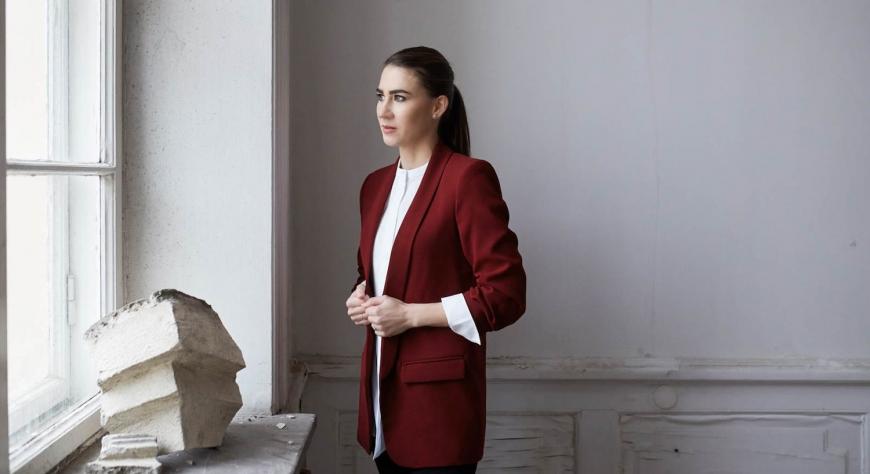
This then led Gardolińska to a Dudamel Fellowship in the 2019-2020 season. Making her North American debut with the LA Phil, she was invited to be second conductor to Dudamel for their performances and Deutsche Grammophon recording of Ives Symphony No. 4.
“I had been looking for a fellowship,” Gardolińska recalled, “and was trying to figure out how to apply, when I learned you can’t apply — so I got invited. I was a fan of Dudamel for many years and was obsessed with him and El Sistema. It was a dream to do this fellowship and from there it only got better. I got to do my [Toyota Symphonies for] Youth concert, The Rite of Spring, with fantastic dancers and it was thanks to this job in England that I was immediately noticed.”
For Gardolińska’s debut, she leads the orchestra in Robert Schumann’s Piano Concerto in A Minor, with renowned soloist Hélène Grimaud, Beethoven’s Symphony No. 7, and Grażyna Bacewicz’s “Overture.” The maestra, who has regularly worked as assistant conductor to Tadeusz Kozlowsky and served as second conductor with the company Johann-Strauss-Operette Wien, said the LA Phil was “keen on programming something Polish,” which fits in with her affinity for rediscovering forgotten operatic and symphonic masterpieces of Polish composers such as Legenda Bałtyku (“Legend of the Baltic) by Felix Nowowiejski and Manru by Ignacy Jan Paderewski.
“I enjoy researching biographies of composers and the circumstances of them not making a huge career and not getting performed as much. I have this feeling it’s time to do justice to these masters. Maybe in my case it has to do with history, with my country. For the longest time we were wiped out from the map and never had good publicity, especially in the arts and 19th-century Polish music.”
Having made a triumphant debut at Opéra national de Lorraine with a new production of Zemlinsky’s Der Traumgörge (“Görge the dreamer”) in 2019, Gardolińska begins a three-year contract as its music director this season. “The response is mostly good and there are a lot of riches to look for. The other repertory we’re usually playing has been recorded multiple times [so] it’s good to challenge all of ourselves.”
As to what makes for good chemistry between an orchestra and conductor, Gardolińska admitted it was a “difficult question. I think this is something that either happens or it doesn’t and I’m not sure I have the amount of experience to distance myself and judge from the outside. Maybe in 10 years I would be able to answer better, but now, everything has to align. If my musical approach fits in a positive way, that can make for a great experience.”
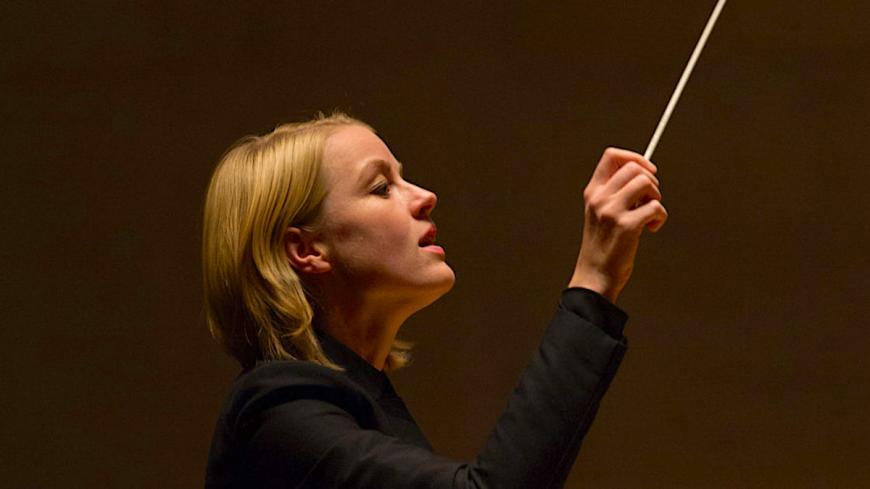
Ruth Reinhardt, 32, who is based in Saarbrücken, Germany, is assistant conductor of the Dallas Symphony Orchestra. In addition, she has guest conducted numerous ensembles, including the Cleveland Orchestra and Malmö Symphony. And while her Bowl debut will have already happened in a concert of Mozart and Mendelssohn, Reinhardt wrote in an email that she was “thrilled and honored to be named a Dudamel Fellow in 2017.
“Getting to be part of such a great institution, hearing the wonderful orchestra over a longer stretch of time and getting to work closely with all the conductors and soloists is a dream for any young conductor.”
As to how a conductor and orchestra can enjoy camaraderie, Reinhardt said she wasn’t sure “if you can completely put your finger on it,” but acknowledged that “the most important thing is to start developing a relationship with an orchestra, to get to know each other and to gain peoples’ trust. Without trust or having people on board, you are pretty powerless as a conductor.”
With these female-centric concerts at the Bowl, the trio agrees that women have been making great strides in the still male-dominated conducting profession. But has being a woman ever been an issue for this accomplished trio?
Reinhardt explained that it was somewhat of a concern for her in the beginning, “but that’s also 15 years ago and the world worked a little differently back then. Bias exists,” she added, “it’s simply an unfortunate reality of the world, but you can’t let that hold you back. If you really believe that this is what you have to do, you can’t let anyone stop you.”
Gardolińska concurs: “I always like a good challenge [and] I knew that going into conducting was going to be one — no matter your sex. At the same time, I was also used to competing with men, because I did that in sports. But I knew if I trained enough and I worked hard enough I could outcompete my male colleagues — unless they were taller than me! It was ingrained in my head that that translates to any other thing I wanted to do, so it was the same approach in conducting.”
New, who said she’s frequently asked that question, replied, “I would have to live in a parallel universe and be a male and see how that works. I much prefer to not go hypothetical. Here I am and I want to prepare and do my best work with an orchestra and find the best solutions to any challenge that has been presented. I like to focus on that. The way we lead and communicate is so personal to us as individual human beings [and] that’s the key to finding solutions and success.”




